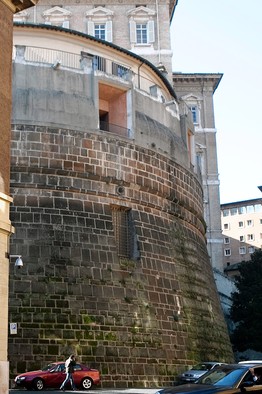
VATICAN CITY—The Vatican bank offered a rare glimpse inside its fortified headquarters as part of the Holy See's efforts to persuade financial regulators and the public that the secretive institution is committed to cracking down on money laundering.
A retinue of Holy See bankers guided journalists through the medieval tower that houses the Institute for Religious Works, the bank's official name, while rebutting allegations by Italian prosecutors that bank practices violate Italy's money-laundering laws by allegedly masking the identity of its clients.
The tour was tightly choreographed, coming at a particularly delicate time for the Vatican. The Holy See is bracing for a ruling from the Council of Europe on whether the Vatican bank is compliant with international standards for fighting money laundering and terrorism. Reporters were barred from bringing cameras and recorders inside Vatican walls, and written questions were submitted in advance of a briefing.
"We finally want to pull back the veil," said Paolo Cipriani, the Vatican bank's managing director. Flanked by a row of stone-faced lieutenants and potted plants, Mr. Cipriani conceded he was "nervous" as he moved through a PowerPoint presentation on the bank.
The operations of the Vatican bank have long been shrouded in secrecy. Shielded by diplomatic immunity, bank officials for decades declined to cooperate with investigations by Italian authorities, including a probe into the 1982 death of Roberto Calvi, an Italian banker with links to the Vatican whose body was found hanging under a bridge in London.
More recently, the bank has been thrust to the front lines of a power struggle between Vatican officials who are at odds over the Holy See's efforts to clean up its finances. In May, Italian economist Ettore Gotti-Tedeschi was ousted as the bank's chairman three years after he was tapped to overhaul the bank. Italian newspapers have brimmed with reports of infighting among prelates that the Vatican says were based on documents leaked by the pope's butler.

Italian prosecutors allege that the Vatican's bank violates money-laundering laws.
Mr. Cipriani described the Vatican bank as a financially cautious organization that has €6 billion ($7.48 billion) in assets, including gold reserves at the U.S. Federal Reserve. The bank invests less than 5% of its portfolio in riskier securities like stocks, Mr. Cipriani said.
Messrs. Cipriani and Gotti-Tedeschi are being investigated by Italian prosecutors for allegedly violating Italy's antimoney-laundering laws. Prosecutors allege the executives allowed the bank to circulate tens of millions of euros through encrypted money transfers that made it difficult for authorities to identify who was behind the transactions.
Mr. Cipriani denied the Vatican bank encrypted its transfers. He also noted that one of the transactions probed by investigators, a €20 million transfer the Vatican ordered through a J.P. Morgan Chase & Co. account, didn't involve clients. Instead, the bank ordered the transfer to purchase German bonds, he said. Mr. Gotti-Tedeschi has denied any wrongdoing. Mr. Cipriani said J.P. Morgan unilaterally closed the account used by the Vatican bank after the two sides clashed over how much information the Vatican needed to disclose about its activities. The banker said he responded to J.P. Morgan's requests for information in an "exhaustive manner." The Vatican bank declined to answer some of J.P. Morgan queries, because questions went beyond legal requirements for disclosure, Mr. Cipriani said. A spokeswoman for J.P. Morgan declined to comment.

No comments:
Post a Comment